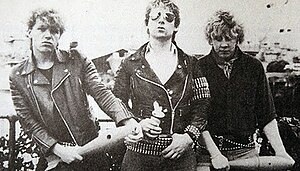Loading AI tools
British heavy metal band From Wikipedia, the free encyclopedia
Warfare was a British heavy metal band from Newcastle upon Tyne that formed in 1982 and disbanded in 1993.[1] They were part of the later stages of the new wave of British heavy metal.[2]
Warfare | |
|---|---|
 | |
| Background information | |
| Origin | Newcastle upon Tyne, England |
| Genres | Speed metal, heavy metal, punk |
| Years active | 1982–1993 |
| Labels | Neat, FM Revolver |
| Past members | |
The band was founded in 1984[3] by drummer/singer Paul "Evo" Evans, guitarist Gunner and bassist Falken. Evo had previously played drums in the punk bands Major Accident, The Blood and Angelic Upstarts,[4] and wanted to "blend metal and punk in a manner not done before".[3] In 1984, Warfare released two singles and an EP. On their first single, the band covered "Two Tribes" by Frankie Goes to Hollywood.[2]
The group also released their debut album Pure Filth in the same year,[2] which was produced by Algy Ward from the band Tank. Cronos from Venom took over vocals and bass on the song "Rose Petals Fall from Her Face". Another EP, Total Death, was released in 1985[2] for the movie Metal City. The band played very few concerts, and the ones they did play turned into violent cacophony.
The second album Metal Anarchy was produced by Lemmy Kilmister from Motörhead,[2] with Motörhead guitarist Würzel as guest guitarist. The album was released towards the end of 1985. Work then began on the third album. During the recording, bassist Falken left Warfare, leaving Cronos to play bass until Zlaughter joined the group as the new permanent bassist.[2]
In 1986, the band released their third album, Mayhem Fuckin' Mayhem, which was produced by Cronos, who also sang guest vocals on "You've Really Got Me", a cover of The Kinks' "You Really Got Me". It was followed by a single with a cover of Robert Palmer's "Addicted to Love". Several concerts followed before the album was released. They interrupted the performances of other bands, including Metallica;[2] Warfare's label Neat Records did not like this and waited until the matter was considered obsolete before releasing the album in 1987.[2]
The fourth album, A Conflict of Hatred, featured Mantas from Venom and keyboardist Lazer joined the band as a new member. After the album's release in 1988, the band moved to FM Revolver Records.[2] The album Hammer Horror, which was a tribute to the British Hammer film studios famous for their horror films, was released on this label in 1990,[5] but Evo was not happy with the label and re-recorded the whole album and released it with extra tracks on Silva Screen Records.
The band disbanded in 1993.[1] Evo appeared on Warhead's 1995 album Warhead with Algy Ward and Würzel. In 2002, the compilation Metal Anarchy – The Best of Warfare was released on Sanctuary Records with a selection of tracks from their releases. In 2021, Warfare released the 3-CD compilation Songbook of Filth[6] which featured Pete Way and Fast Eddie Clarke playing together for the first time ever.[citation needed]
Warfare's style has often been compared to that of Tank, Motörhead and Venom, each of whose members also produced one of Warfare's first three albums and contributed to several of their albums.[4][5][7] Chris Ward of OneMetal compared "Burn Down the King's Road" from their debut Pure Filth to Venom covering The Clash.[8] Eduardo Rivadavia of AllMusic called the album a slightly slower Motörhead and noted its punk influences.[9]
Urban "Wally" Wallstrom of RockUnited described Metal Anarchy as being "almost recorded live" in three days; the album "couldn't be more primitive and brutal".[4] According to Ward, the song "Living for the Last Days" would not have sounded out of place on Motörhead's album Orgasmatron, released the same year.[8] Wallstrom also described it as entertaining to hear Evo sing Barry McGuire's anti-war song "Eve of Destruction" on the re-release of Metal Anarchy. He described the style of the album as "1980s metal/punk/thrash" and a mix of Motörhead, Tank, Venom, Raven and Bad News.[4]
According to The Thrash Metal Guide, the music on A Conflict of Hatred developed in the direction of more intricate thrash.[5] On Hammer Horror, the band incorporated orchestral passages, doom-heavy riffs, atmospheric, "eerie" passages and, on "Phantom of the Opera", female vocals and "spooky" keyboard melodies; the Guide also sees the album as an influence for later symphonic doom/gothic metal.[5]
Studio albums
Compilations
EPs
Singles
Other releases
Seamless Wikipedia browsing. On steroids.
Every time you click a link to Wikipedia, Wiktionary or Wikiquote in your browser's search results, it will show the modern Wikiwand interface.
Wikiwand extension is a five stars, simple, with minimum permission required to keep your browsing private, safe and transparent.